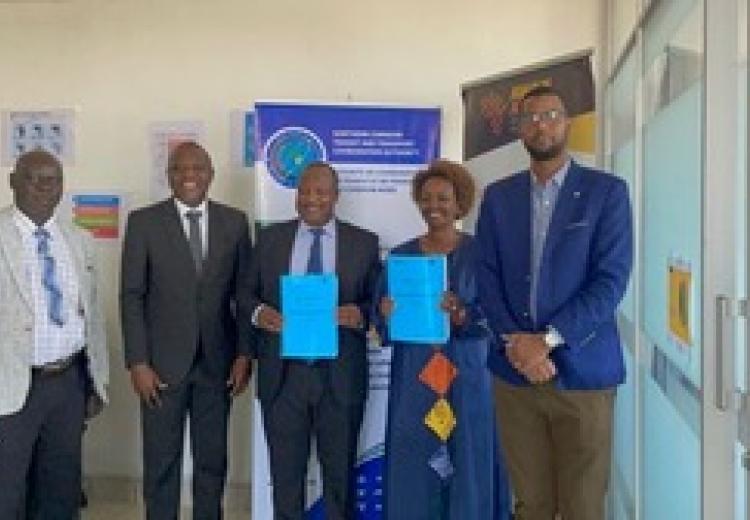NCTTCA-AWAN AFRIKA’s Longstanding Partnership to empower Women and Youth in Cross-border Trade
On 15th February 2024, the Northern Corridor Transit and Transport Coordination Authority (NCTTCA) and Africa Women Agribusiness Network-Afrika (AWAN AFRIKA) sealed a longstanding partnership culminating in a harmonised joint work plan and a Partnership Agreement (MoU).

The MoU is intended to enable the two parties to explore and collaborate in the areas of Regional Socio-Economic Development through co-creation, joint planning, implementing, executing, monitoring, and evaluation of programs in the Northern Corridor Member States, covering; Cross Border Trade, Mainstreaming of social economic dimensions of poverty, Gender, and equity, Resource mobilization for projects agreed upon, as well as any other undertaking involving socio-economic issues affecting regional trade, transit transport and logistics value chains in the East Africa Region.
Specifically, the NCTTCA and AWAN AFRIKA agreed to jointly develop value chains-based Market Systems and trade facilitation around large Off-takers in the East African Northern Corridor and the newly created African Continental Free Trade Area (AFCFTA); collaborate in the facilitation of capacity building, skills upgrade training, creation of learning content and programme delivery benefiting their Members; and very importantly, collaborate on enabling access to Finance and Investor Readiness for members of AWAN AFRIKA and Women, Youth, and MSME traders in the Northern Corridor region.
In October 2023, the NCTTCA and AWAN AFRIKA, in partnership with the Food and Agriculture Organisation of the United Nations (FAO), successfully conducted a three-day Market Access Master Class to equip Women Agri-Traders along the Northern Corridor with new skills, under the theme: “Tackling Gender Dimensions of Trade & Strengthening Resilience in the Small and Medium Agro-Enterprises within the Northern Corridor.”
The Market Access Master Class event attracted 27 participants drawn from the NCTTCA member states namely Burundi, DRC, Kenya, Rwanda, Uganda, and South Sudan.
The ultimate objective of the Market Access Master class was to leverage the participant's marketing strategy abilities to expand their trade and market access opportunities, not only within the East African Northern Corridor but also across the broader African Continental Free Trade Area.
Mr. Omae Nyarandi, the NCTTCA Executive Secretary in his speech during the opening ceremony of that capacity-building opportunity noted that women involved in cross-border trade are faced with discrimination and cross-border challenges while crisscrossing among member states.
“COVID-19 brought a lot of challenges in cross-border movement, but working with partners we are trying our best to facilitate the cross-border trade and make it essential, but still there are a lot of challenges,” said Mr. Nyarandi who also stressed the need for the respective governments to put in place proper policies to protect women involved in cross-border trade.
He added: “In the East Africa region, Agriculture accounts for more than 32% of GDP and employs over 80% of the labour force; in addition to generating 65% of foreign exchange earnings. Therefore, to stimulate growth and socio-economic development in the East African region, the Agriculture Sector needs to be adequately supported especially in the areas of ensuring sustainable production, value addition, meeting standards, and effective transportation of produce to the final destination across regional borders”.

Dr. Nomathemba Mhlanga, an Agribusiness Officer at FAO who attended the workshop appreciated the great work that the women Agri-traders were doing in East Africa.
She stated that FAO is looking forward to collaborating with other development partners to see how collectively to harness the agri-traders' potential to play a critical role in the growth of economies in East and Central Africa.
“MSMEs are key stakeholders in fighting against hunger and are at the forefront to supplying to the different stakeholders including providing inputs to farmers that produce food for the African continent,” said Dr. Mhlanga.
She appreciated NCTTCA for prioritising agricultural products and services during the COVID-19 pandemic era; despite the effects of the Russia war that affected the movement of agricultural inputs like fertilizers.
She assured the meeting that FAO remained committed to the development of MSMEs in food value chains and looks forward to furthering its collaboration with AWAN Afrika, NCTTCA, and its member states.
In her speech Beatrice Gakuba, the executive director of AWAN-AFRIKA appreciated workshop participants and thanked them for being the champions in Cross-border Trade and being a voice for the voiceless in addressing specific challenges faced by women Cross-border Traders.
She emphasized the need for the women agri-traders to harness the opportunities of networking and noted that money had no gender, but rather, the issue lay on how gender accesses it, highlighting on specific abuse that women go through at the border posts. She went on to stress the biggest violence against women in Africa is Economic Violence.
Ms. Gakuba called upon the participants and concerned stakeholders to lobby and advocate for our governments to provide resources for the economic empowerment of women if women were to become economic champions.
She noted that Women feed 80% of the African continent, therefore, engaging more women in business and trade will automatically grow the economy. ‘The Africa we want must overpower Africa we don’t want’.
According to the post-event report produced by the NCTTCA, the Master Class Training was inspired by the fact that Women in agriculture/agribusiness often operate outside the formal value chains in their countries.
“This resulted in struggles to negotiate better terms of trading due to lack of adequate soft skills, restrictive access to markets and trade intelligence which is crucial to aiding them secure consistent market outlets for their products,” stated the report.

